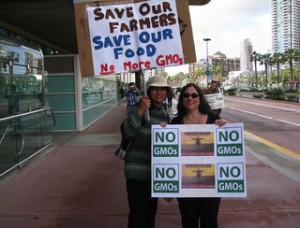Why Do People Fear G.M.O.’s?
Genetically modified food (or G.M.O.’s) continue to provoke heated debates about safety and labeling, even though scientific evidence indicates they’re safe. Why? A new article in Cosmos by David Ropeik explores the psychology behind people’s G.M.O. fears. Here is Ropeik on why man-made risks “feel” scarier than natural risks.
Beyond those heuristics, several specific emotional characteristics also make G.M.O.’s feel scary. These “fear factors” have been identified in pioneering research in risk perception by Paul Slovic at the University of Oregon, Baruch Fischhoff at Carnegie Mellon University, and others. You can hear them pop up as the young man explains his fears. “It’s just not natural to take the gene from one species and put it in another. It’s just not natural!”
Indeed, taking a gene from a soil bacterium (Bacillus thuringiensis – Bt) that produces a natural pesticide and injecting that gene into the DNA of a soy plant, is hardly Mother Nature’s way of hybridising plants. But does that have anything to do with whether it’s actually risky? No. Scientifically, whether something is a risk depends on whether it is physically hazardous, in what ways and at what dose, and whether we’re exposed, at what age and how often. A radioactive particle in your lungs can cause cancer whether the particle came from the natural breakdown of uranium in the soil, which produces natural radon gas, or from a nuclear power plant accident. But risk perception research has found that natural risks don’t feel as scary as the the equivalent man-made risks.


Comments